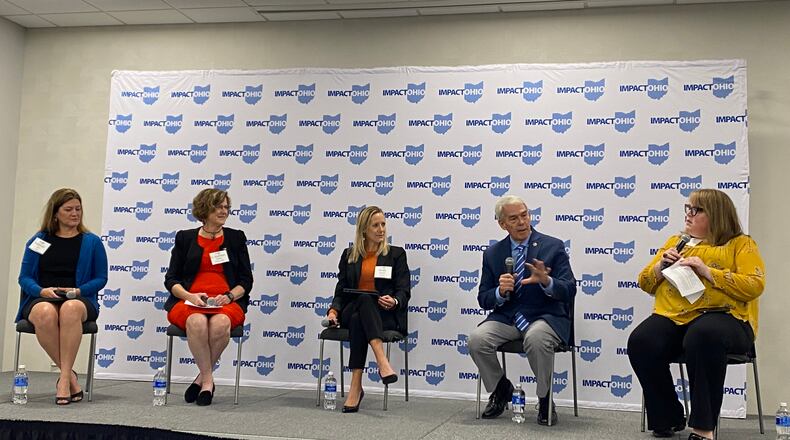Panelists on “The Continuum of Workforce and Talent Policy” talked about the importance of K-12 education working with community colleges and higher education to get people prepared for the workforce, but also getting companies involved with young kids.
Kathleen Cleary, interim provost and senior vice president at Sinclair Community College, said childcare, finances, transportation and changing work schedules were among the problems that current community college students face.
She said there are easier paths for people to get into the workforce. People should be able to get credit for skills they might have picked up, for example, in the military, she said.
“We need to look at a frictionless pathway that would take advantage of the same kind of services that we have in other parts of our lives with places like Amazon or online deliveries and saying how can we do this in a way that gets people the talent they need in the most efficient path possible,” Cleary said.
Chancellor Randy Gardner of the Ohio Department of Higher Education noted that many people with bachelor’s degrees are now going back to get associate degrees.
“The bottom line is if we’re going to strengthen our economy, we’re going to have to have more people with the kinds of credentials and degrees, and skills to really power this economy,” he said.
At the panel on redistricting, the speakers talked about what is affecting the process, such as an Ohio constitutional amendment from 2018 and more political polarization.
Lee Hannah, professor of political science at Wright State, noted that liberals mostly are moving to cities while conservatives are staying in or moving to rural areas. He said that geographical change could affect how political parties could be represented evenly.
“Democrats across the country, they live, what we would call inefficiently, where you’re going to have a lot of wasted votes,” Hannah said. “They’re going to be in districts that go 70% or 80% for a Democrat, but you know they aren’t diluted to make other areas competitive.”
Kevin DeWine, former chairman of the Ohio Republican Party and Aaron Pickrell, a Democratic campaign consultant, also spoke on the panel.
The American Rescue Plan Act panel of Matt Damschroder, director of the Ohio Department of Job and Family Services, Debbie Lieberman, Montgomery County Commissioner and Ohio Rep. Phil Plummer discussed ways the money will be spent, including on infrastructure that needs replaced in Montgomery County and on opioid funding.
“We have many, many buildings, and, of course, in our partnership with Dayton, we have a lot of water lines and sewer lines, and just a lot of that,” Liebermann said. “So I would say, a big chunk of our money’s going to go toward that.”
The Dayton conference is endorsed by the Ohio Democratic and Republican parties.
About the Author

